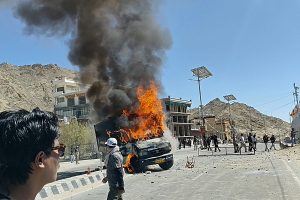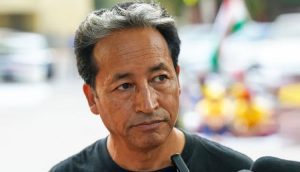New Delhi – The Supreme Court is scheduled to hear a petition filed by activist Sonam Wangchuk’s wife challenging his detention today, marking a critical legal battle over the Wangchuk arrest that followed violent protests in Ladakh. The renowned environmental activist and education reformer has been detained under the stringent National Security Act following demonstrations demanding statehood that turned violent in Leh last month.
Background of Wangchuk Arrest and Detention

The Wangchuk arrest occurred on September 26, following violent protests in Leh that erupted on September 24. Authorities detained Wangchuk from Ladakh and subsequently transferred him to Jodhpur jail in Rajasthan, where he has been booked under the National Security Act. This law permits preventive detention in cases involving national security concerns or threats to public order.
The habeas corpus petition challenging the Wangchuk arrest was filed under Article 32 of the Constitution on October 2, just days after his detention. The constitutional provision allows citizens to approach the Supreme Court directly when fundamental rights, including personal liberty, are allegedly violated.
Circumstances Leading to Wangchuk Arrest


The Wangchuk arrest followed violent clashes in Leh on September 24, when protesters demanding statehood for Ladakh confronted police forces. During the confrontation, police opened fire to control the situation, resulting in four deaths and numerous injuries. Protesters also set ablaze the Bharatiya Janata Party headquarters in Leh during the unrest.
Authorities imposed curfew and blocked internet services across the region as the situation escalated. The administration directly blamed Wangchuk for inciting the violence through provocative speeches and statements, forming the basis for his subsequent detention under the NSA.
Government Allegations Following Wangchuk Arrest
Days after the Wangchuk arrest, the Ladakh administration issued a detailed statement accusing the activist of repeatedly invoking the concept of “self-immolation” in his public speeches. Officials drew parallels to protest tactics historically used in Tibet, arguing that such rhetoric posed serious threats to public order and community safety.
The Union Home Ministry stated that mob violence in Ladakh over statehood demands was guided by provocative statements from Wangchuk. According to the ministry, on September 24 at approximately 11:30 AM, a mob motivated by his speeches left the hunger strike venue and attacked a political party office and the office of the Chief Executive Councillor of Leh. The attackers set these offices on fire, assaulted security personnel, and torched police vehicles.
Formal Charges in Wangchuk Arrest


The administration confirmed that “grounds of detention” were formally served to Wangchuk following his arrest. He remains incarcerated under the National Security Act, which allows authorities to detain individuals without immediate trial when national security or public order concerns are alleged.
Authorities allege that the Wangchuk arrest was necessary because he played a key role in inciting the demonstrations that resulted in violence, casualties, and property destruction. The government maintains that his speeches and public statements directly motivated protesters to engage in violent actions.
FCRA Cancellation Following Wangchuk Arrest
Beyond the criminal detention, the government cancelled the Foreign Contribution Regulation Act registration of Wangchuk’s nonprofit organization, the Students Educational and Cultural Movement of Ladakh. Authorities cited repeated violations of laws governing foreign funding for non-governmental organizations.
The three-decade-old NGO has worked extensively in Ladakh on alternative education programs, environmental conservation initiatives, and youth empowerment projects. The FCRA cancellation represents a significant blow to the organization’s operational capacity and future funding prospects.
Wangchuk’s Message from Custody
Despite the Wangchuk arrest and ongoing detention, the activist conveyed messages to Ladakh residents through his legal advisor, Haji Mustafa, and his elder brother Ka Tsetan Dorjey Ley, who visited him at Jodhpur jail. Wangchuk appealed to people of Ladakh to maintain peace and unity while continuing the statehood struggle through Gandhian principles of non-violence.
Wangchuk demanded an independent judicial inquiry into the killings of four people during the September 24 violence. He stated his willingness to remain in jail until such an inquiry is conducted, demonstrating his commitment to accountability and justice for the deceased.
In his message posted on social media by Mustafa following the jail visit, Wangchuk assured supporters about his physical and mental well-being. He expressed gratitude for prayers and concern from supporters while extending heartfelt condolences to families of those killed and prayers for injured and arrested individuals.
Legal Arguments Against Wangchuk Arrest
The habeas corpus petition challenging the Wangchuk arrest likely argues that his detention violates constitutional protections of personal liberty and free speech. Legal experts note that NSA detention requires substantial justification demonstrating immediate threats to national security or public order that cannot be addressed through ordinary legal procedures.
The petition may contest whether Wangchuk’s speeches constituted genuine incitement to violence or represented protected political expression criticizing government policies. The constitutional balance between maintaining public order and protecting fundamental rights forms the central legal question the Supreme Court must address.
Conclusion: Constitutional Rights at Stake
The Supreme Court hearing on the Wangchuk arrest presents fundamental questions about limits of preventive detention, political expression rights, and government authority to suppress dissent. The case outcome will significantly impact future activism in Ladakh and establish precedents for handling political protests demanding constitutional rights like statehood.

